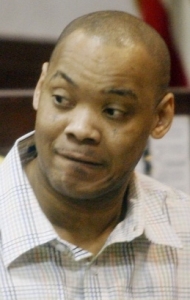Swinson pleads in shooting, murder
By Nick Hiltunen
Published in News on October 16, 2008 1:46 PM

News-Argus/GREG SOUSA
Richard Lee Swinson, who pleaded guilty to firing gunshots into a Davy Boulevard apartment complex in Mount Olive and killing Jennifer Louise McArthur on June 30, 2005, is seen in Wayne County Superior Court on Wednesday.
A Mount Olive man pleaded guilty Wednesday in the death of Jennifer Louise McArthur, and received 15 years in prison for the crime.
Richard Swinson, 30, formerly of Hillsboro Street, was accused of firing multiple gunshots into an apartment on Daly Boulevard on June 30, 2005, in the early morning hours.
One of the shots, fired with a weapon of the same class as an AK-47, hit Ms. McArthur in the back, Assistant District Attorney Paige Rouse said.
The guilty plea came quickly during a 10-minute recess of the court, as defense attorney David Sutton began explaining the process of accepting a plea bargain at the defendant's table.
Ms. Rouse, the assistant district attorney, watched and listened to the exchange with tightly folded arms, and looked at law enforcement officers present with a grin.
The plea deal with prosecutors allowed Swinson to avoid life in prison with no chance of "post-release supervision," which replaced "parole" in 1994 when structured sentencing was enacted by law.
The agreement with prosecutors meant Swinson avoided a first-degree murder charge, pleading instead to second-degree murder, which carries a lighter possible sentence and a chance of one day getting out of prison.
Swinson's decision to take a plea came just after the testimony of former Mount Olive Police Detective Jimmy Stevens, who sat in a darkened courtroom and identified pictures of the crime scene.
Ms. Rouse, who refused to comment after completion of the trial, asked her questions quietly and succinctly, as she did throughout most of Swinson's proceedings.
"The bullet hole you just told the jury about -- where were they situated about on the apartment?" Ms. Rouse said to Stevens as he sat in the witness stand.
"They were ... in the bedroom and also one in the living room," Stevens said.
The district attorney asked permission to approach the detective on the stand and handed him a manila envelope, asking him if he could unseal it.
"When you open State's Exhibit 20-B, what do you find?" Ms. Rouse asked.
"Smaller evidence bags," the detective said.
"State's Exhibit 20-B-3, I would ask if you could identify that item that I'm handing you," Ms. Rouse said.
"An evidence bag containing a film canister case containing a lead projectile," the detective said in response.
The detective was asked to describe the chain of custody for evidence, and said that only two people had access to the evidence room at the time of the murder investigation, himself and Lt. Tommy Brown.
After the trial was over, Swinson's defense attorney said the state's case against him for murder was based on circumstantial evidence.
"They didn't have any fingerprints, DNA, no murder weapon, so did he do it, or didn't he do it, is based on circumstantial evidence," Sutton said.
At around 11:30 a.m. Wednesday, with the jury still at recess, Judge John E. Nobles Jr., learned of the plea arrangement upon he re-entering the courtroom.
"All right, that's fine," Nobles said on hearing of the plea deal, and asked the clerk to swear in Swinson, who was still standing next to his attorney at the defendant's table.
"Pursuant to the offer ... do you now plead guilty?" Nobles said.
"Yes, sir," Swinson said.
Swinson was asked if he had been coerced into giving the statement in any way other than the Assistant District Attorney's offer.
The judge also asked Swinson if he understood that the maximum sentence the judge could impose, regardless of any plea deal with prosecutors, could be 40 years in prison.
"Yes, sir," Swinson said in response.
"Do you understand, by your plea, you are giving up your valuable right to a (jury trial)?"
"Yes, sir," Swinson said.
Most of the civilian attendees of the trial refused comment to the newspaper during and after the proceedings.
A woman who identified herself only as the murder victim's aunt, attended the last day of the trial.
"I would think it would be appropriate that there would be an apology to the family," the aunt said.
Swinson did not offer an apology to the family after entering his guilty plea, and the judge did not probe for one.
The judge did, however, have a lengthy discussion with jurors after they re-entered the courtroom.
"Ladies and gentlemen, this case has been resolved without you making a decision," the judge told the jury when they returned. "I recognize that it is a heavy burden to carry. The defendant pled guilty to second-degree murder and was sentenced."
Nobles continued to speak to the jury for an extended period of time.
"(The plea deal) that resolves the case, and often resolves the case in the best fashion," Nobles said. "Any time that the two sides are against each other, and they work out an agreement, that's fine."
